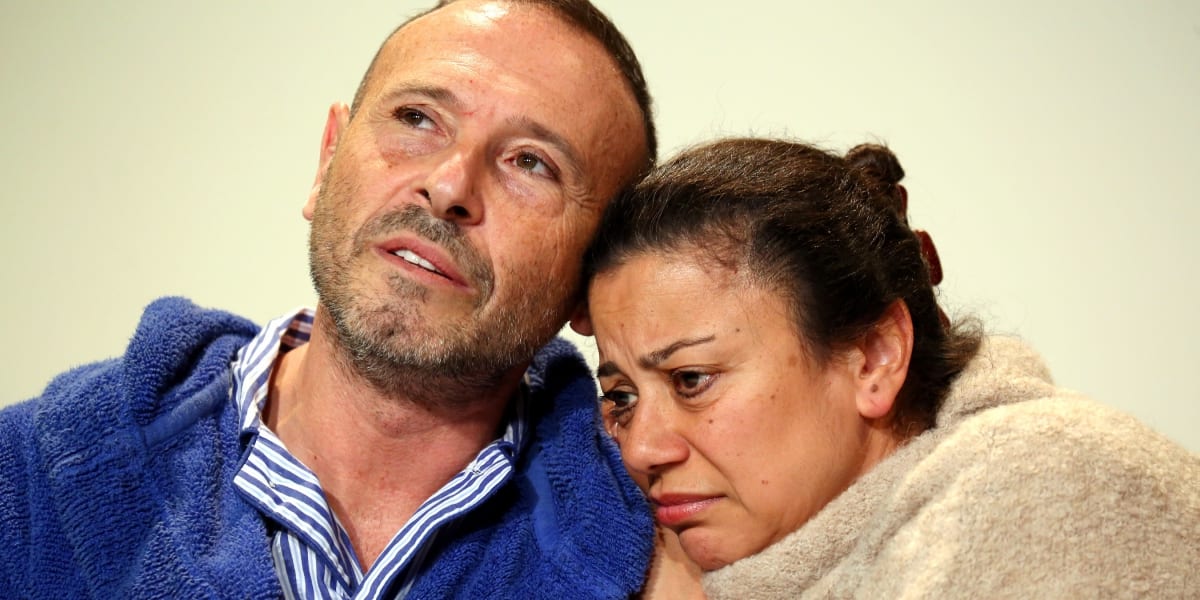This thriller was produced to acclaim at the Camden venue Theatro Technis last year and returns now for a welcome second outing, with mainly the original cast and a few tweaks to plot and script. There are many points to admire here, especially the strength in depth of the acting and the gathering pace and intensity of the second half, where the writing and plotting are at their most gripping and impressive. However, there are problems in the first half where the pace of the exposition is often too sedate and the many scene changes proceed in a somewhat too leisurely fashion.
The very start though is more than urgent enough. Businessman Mark (Craig Karpel) collapses in front of us, bleeding profusely from stab wounds. We hear him reporting himself as a victim of an apparent car-jacking before the scene switches to a hospital and his long recovery from his wounds supported by his wife (Niki Myonas) and best friend Dave (Simon Ryerson) and a sympathetic police inspector. All is not quite as it seems and this story gradually unravels into another scenario and sequence of events altogether.
It is not really helpful to discuss any plot elements any further, but suffice to say that author/director Yasir Senna rings the changes skilfully, though there are a few extraneous elements involving a private detective and a school headmaster who might have been omitted to reduce the running time a little. The main roles are complex enough to allow the core group of actors a lot of scope to set out some rich characterisations that themselves suggest elements of the final denouement long before the plot threads clearly combine in that ultimate direction. With a bit of trimming overall then more air time could have gone to Charlotte Campbell, who is compelling in all her scenes, and whose role is somewhat underwritten, given the significance she plays in the drama.
Particular credit belong to Karpel, Ryerson and Mylonas in credibly portraying a middle-aged trio who have known each other for many years. Karpel’s unstable combination of brittle charm, narcissism and menace is brilliantly sustained across the whole gamut of the play from which he is rarely absent. The actor memorably controls the changes in our responses to his depicted actions. Ryerson’s role in contrast has a slow-burn technical skill to it that commands admiration: for much of the play he is the put-upon foil and cover for his brighter and more successful friend. But when he does come into his own in the later stages, his performance is all the more memorable simply because the core elements of it have been embedded in our minds early on. Mylonas too reveals many layers in her role, moving from a conventional supportive wife through to a much more combative and feisty embodiment in the later scenes where she has to act in some ways as the conscience of the audience too. Rosalie Carn offered an odd performance as a French police inspector, whose motives and switches of mood and tone were never entirely explicable, but perhaps the issues here lay more in the writing than the performance.
While it was good to see the stage hands take a bow at the end of the play alongside the cast, there really should not have been so much need of them given the minimalist set and furniture. The demands of pace, excitement and fluent progress are more important, especially in this kind of drama. Razor Sharp productions should have lived up to their name more in this regard, and given fewer pauses for audience reflection. It might have been easier in this respect if the writer had not also directed – a fresh pair of eyes could easily have streamlined these technical issues and released even more energy in the actors.
This is a very creditable play with many fine scenes that never quite adds up to more than the sum of its considerable parts. One hopes that as a result of this further exposure it can be tightened up further and perhaps offered up in next year’s Edinburgh Festival where in genre, acting quality, and method it has the potential to enjoy a real success.

